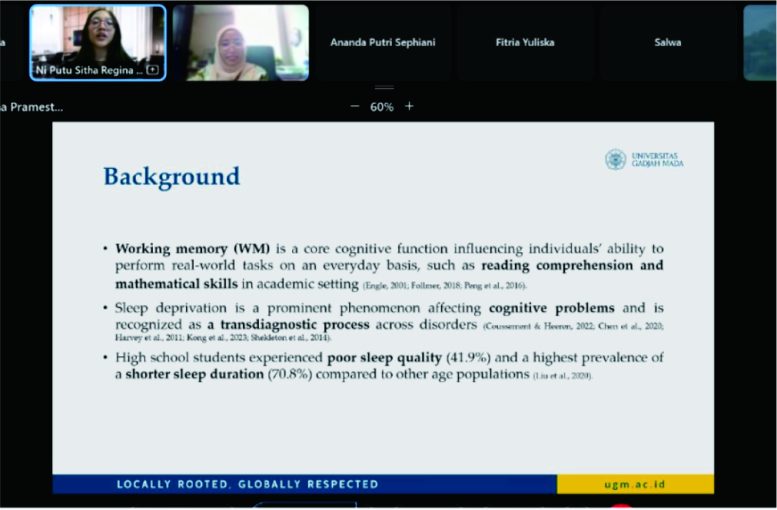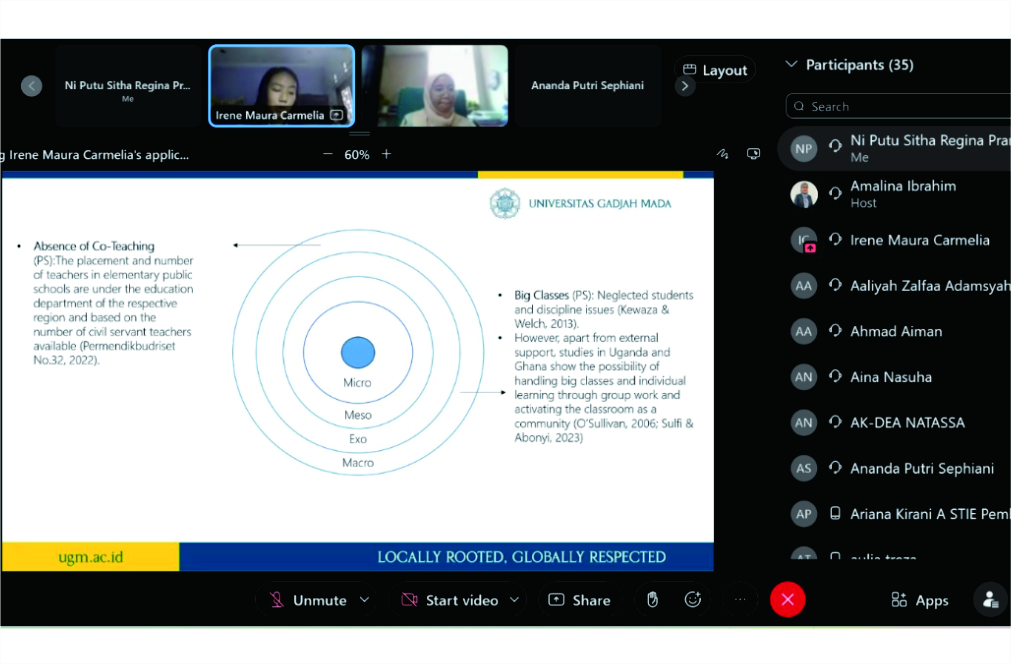
On Thursday, 16 January 2024, IUP Psychology conducted a seminar with Universiti Teknologi Malaysia for the event titled “Undergraduate Final Year Project International Seminar 2024”. In this seminar, three students of IUP Psychology participated as speakers where they briefly presented their thesis. The first participant, Ni Putu Sitha, presented her thesis about sleep deprivation, with the title “The Effect of Moderate Sleep Deprivation on Working Memory Performance.” Her experience was both enlightening and engaging. The virtual platform provided an opportunity to connect with a diverse audience interested in the world of research and, of course, the intricate relationship between sleep and cognitive function.
She began by introducing the significance of the study, highlighting the pervasive nature of sleep deprivation in modern society and its potential impact on daily cognitive tasks. The presentation delved into the methodology, emphasizing the careful balance between ethical considerations and scientific rigour in conducting experiments involving sleep deprivation. The online seminar experience not only enriched her knowledge but also instilled a profound sense of gratitude for attendees’ shared enthusiasm and dedication to advancing scientific discourse in this crucial field.
The second presenter is Syahirah Khadijah. She has always been fascinated with the complexity of humans in romantic relationships until one day she questioned, “Why do anxious individuals find it hard to commit to their partner despite their ‘obsessive’ tendencies to stay close?’ Rooting from the self-scrutiny and research inconsistency, she developed that question into her thesis titled “The Role of Anxious Attachment Style to Romantic Relationship Commitment Among Late Adolescents in Relationship: Felt Security as a Mediator”. In her research, she focused on how anxious individuals’ attributes, such as low self-esteem, self-doubt, and lack of self-confidence, may contribute to their lack of desire to maintain the relationship and the intention to persist. This study focuses on late adolescents in dating relationships because dating has been seen as a fundamental experience in Indonesia’s adolescents and how commitment has changed significantly in our society. In exploring her thesis, she discovered the concept of felt security, which plays a mediating role in explaining the relationship between the two. For those unfamiliar with the terms, felt security is the perception that one’s partner is available and responsive and the degree to which a partner loves and cares for the self. Her research contributes to the ongoing discourse by positing that a heightened anxious attachment style is associated with diminished levels of commitment with felt security as the mediating variable and extending the understanding of romantic relationship commitment among late adolescents in social psychology. This research was valuable as she explored more about anxious individuals and how they perceive partners and their commitment.
The last presenter, Irene Maura presented her thesis related to growth mindset, with the title of “Exploring Teachers’ Growth Mindset in Indonesia: Promotive Factors, Maintenance, and Challenges in Implementation.”

The thesis is conducted through qualitative methods, consisting of interviews with teachers, principals and students from three different types of primary schools in Yogyakarta. The study aims to dig deeper into the promotive factors, actions to nurture, and challenges of teachers’ growth mindset practice at school. In their efforts to provide quality education, the teaching team benefits from support both within and outside the school. Internally, the teachers play a crucial role by being really helpful, and externally, the school system adds strength. Drawing on past experiences, they observe and guide students through their growth. However, challenges arise from various sources, both inside and outside. Despite these difficulties, the team remains resilient, relying on support from both internal and external channels to ensure students enjoy a fulfilling and comprehensive learning journey.
Author: Andhila Sasadara Krisnanda
